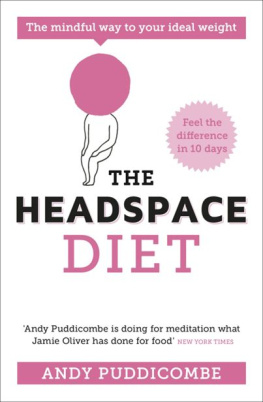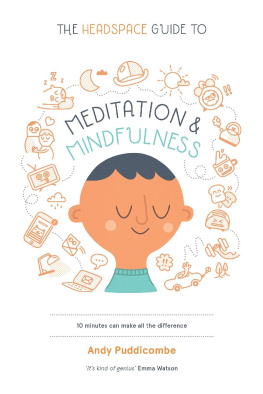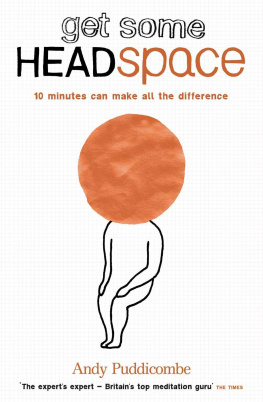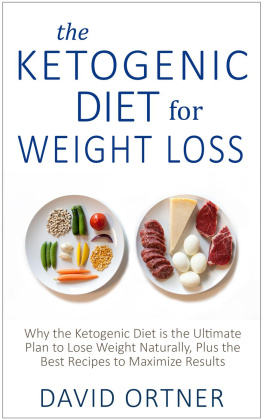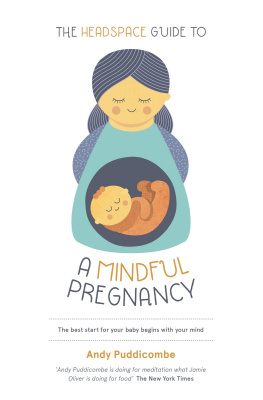Also by Andy Puddicombe:
Get Some Headspace
About the author
Andy Puddicombe is a registered Meditation Consultant and a former Buddhist Monk. His meditation training has taken him all over the world. Andy returned to the UK in 2004 and set up Headspace with one simple aim in mind: to demystify meditation and make it accessible and relevant to as many people as possible.
THE HEADSPACE DIET
Andy Puddicombe

www.hodder.co.uk
First published in Great Britain in 2012 by Hodder & Stoughton
An Hachette UK company
Copyright Andy Puddicombe 2012
The right of Andy Puddicombe to be identified as the Author of the Work has been asserted by him in accordance with the Copyright, Designs and Patents Act 1988.
All rights reserved.
No part of this publication may be reproduced, stored in a retrieval system, or transmitted, in any form or by any means without the prior written permission of the publisher, nor be otherwise circulated in any form of binding or cover other than that in which it is published and without a similar condition being imposed on the subsequent purchaser.
A CIP catalogue record for this title is available from the British Library
ISBN 978 1 444 72224 6
Book ISBN 978 1 444 72218 5
Hodder & Stoughton Ltd
338 Euston Road
London NW1 3BH
www.hodder.co.uk
Contents
Acknowledgements
I am always touched by the support and generosity that we receive at Headspace and Id like to thank everyone who has contributed to, assisted with, or inspired the writing of this book. In particular Id like to thank:
Dr Judson Brewer, Neuroscientist from Yale Medical School, for his advice, support and insightful foreword;
Rich Pierson and the entire Headspace team, for their passion, encouragement and creative drive to make Headspace and The Headspace Diet everything it is;
Nick Begley, Head of Research at Headspace, for his extensive scientific contributions;
Hannah Black, Kate Miles and the entire Hodder team for once again making the process of writing so enjoyable and straightforward;
Lucinda Puddicombe, Exercise Physiologist and Dietary Consultant, for her advice and expertise, but more importantly still, for agreeing to be my wife. I love you very much.
And last, but by no means least, my family, friends and the intensely loyal Headspace Community, who are a constant source of inspiration with their stories of success and who encourage me on a daily basis to make meditation and mindfulness more accessible to all.
A very big thank you to each and every one of you.
A Bit about Headspace
Headspace was set up in 2010 by Andy Puddicombe and Rich Pierson, to help demystify meditation and promote the use of mindfulness making them accessible, practical and relevant tools for modern-day living.
The mission of Headspace is to get as many people in the world as possible to take 10 minutes out of their day to practise a simple mindfulness-based meditation technique (included in this book), the type of which has been scientifically proven to promote a wide range of health benefits.
In fact Headspace are actively working in partnership with Yale Medical School, University College London, and many other respected universities around the world to further the understanding of meditation, and to highlight the significant impact it can have on the lives of those who practise it on a regular basis.
The broader vision of the project is to encourage people to integrate this simple yet powerful practice into everyday life. Mindful eating, the topic of this book, is just one example of how mindfulness can be applied to a very ordinary activity to achieve extraordinary results. In short, a happier, healthier and more balanced way of life.
If youd like to join the hundreds of thousands of people already enjoying the benefits of the Headspace Take10 programme, you can sign up for it now, free of charge, at www.getsomeheadspace.com/books/theheadspacediet or by downloading our mobile App, Headspace (on-the-go).
For all other information about Headspace, the Headspace Journey, the subscription programme, events, scientific research, or the Headspace Foundation, please visit the website at www.getsomeheadspace.com
You can also follow Headspace on Facebook and Twitter:
www.facebook.com/HeadspaceOfficial
Twitter @Andy_headspace
@Get_Headspace
Foreword
Judson Brewer MD PhD
Medical Director, Yale Therapeutic Neuroscience Clinic
Yale University School of Medicine
In his new book, Andy Puddicombe has done a superb job of clearly articulating how and why eating, and indeed over-eating, has become such an issue for so many of us. At the same time, he introduces the concept of mindful eating in a practical and accessible way, demonstrating how mindfulness may well hold the key to unraveling many of these widespread problems.
In my own research I see so many of us learn to associate different moods and emotions with eating. We go out to dinner to celebrate an event, or feel depressed and eat to feel better. This pattern of behaviour becomes habitual and the next time we feel down, our brain says, Hey, last time you felt this way, you ate chocolate and felt better. Do it again!. And so a spectrum of behaviours develop, ranging from comfort eating to food addiction.
Only when we can stop and notice this chain of events, can we start to change our behaviour. This is where mindfulness comes in. It teaches us to simply observe thoughts as thoughts, feelings as feelings, cravings as cravings, and nothing more. Mindfulness training gets to the heart of the problem, enabling us to change our behaviour while maintaining our sanity and happiness.
I started meditating in medical school after going through a stressful breakup. Before long I was calmer, less stressed and, by the time I completed my MD/PhD, I was meditating every day. I was so impressed with the effects of meditation that I switched my entire research career path away from studying mouse models on the effects of stress on the immune system, to studying the effects of mindfulness and meditation in humans, and how it can help them with addictions.
In a recent mindfulness study here at Yale, we found that a meditation-based approach to smoking cessation actually beat the American Lung Association program in just 4 weeks, which has long been regarded as the gold standard in the US. There were no drugs involved and it required very little time each day, with the participants simply learning the fundamentals of mindfulness and an accompanying technique. I mention this because there are many parallels to the addiction of smoking and the current obesity epidemic.
As with food, people addicted to cigarettes habitually reach for a cigarette when under stress. This makes them feel better temporarily, but the fix doesnt last, and so the next time they get stressed, they have another cigarette, reinforcing the habit. In our study we taught people how to simply observe their thoughts, emotions, and cravings, and to notice how these led to smoking. When they could clearly see that they were driven to smoke by cravings, they were then able to observe these as sensations, rather than experiencing a compulsion to act. By observing and not acting, they were disengaging the chain, and unlearning the feeling > craving > smoking association. And what we found was that the more they practiced meditation, the better they did.
The numerous studies being carried out by my laboratory, and other laboratories across the world, are starting to show that mindfulness training is an excellent tool for changing behaviour for good. The implications for how it can affect the way we shop, cook, eat and relate to the food around us is nothing short of profound.

